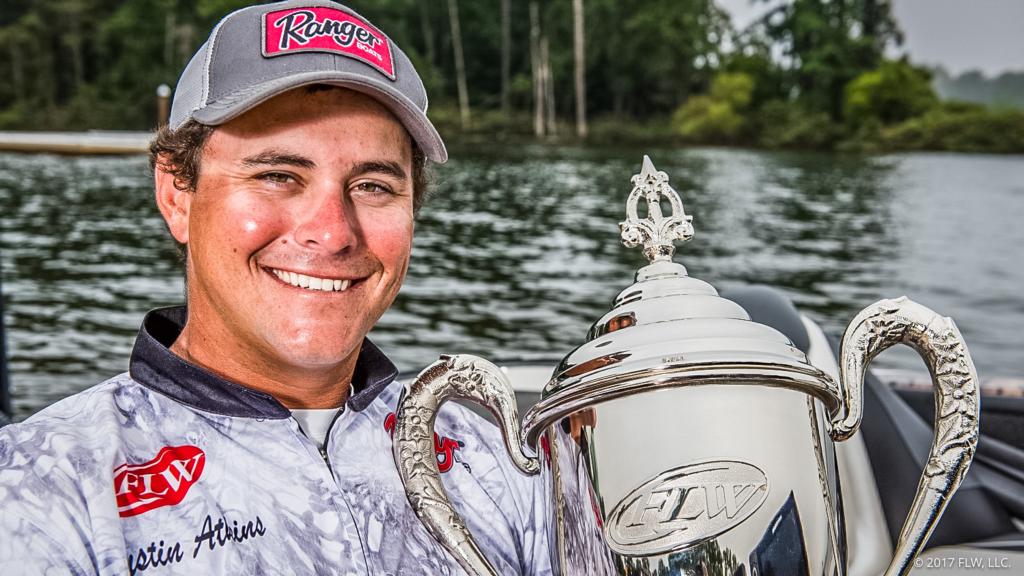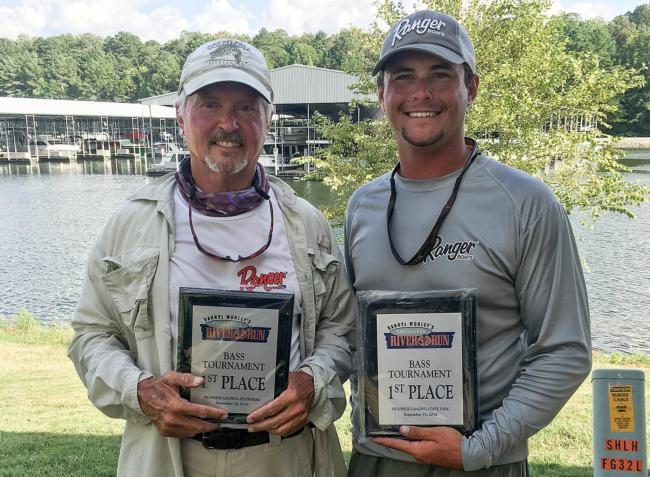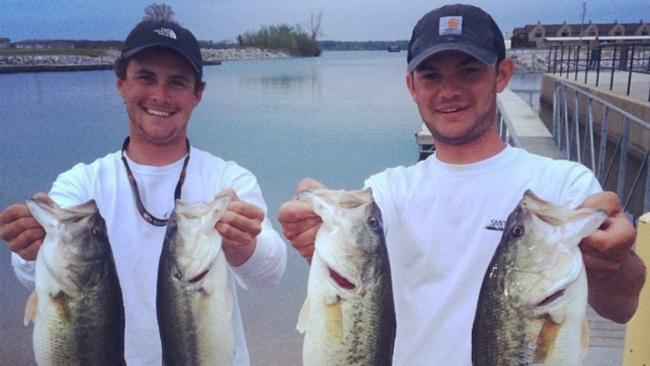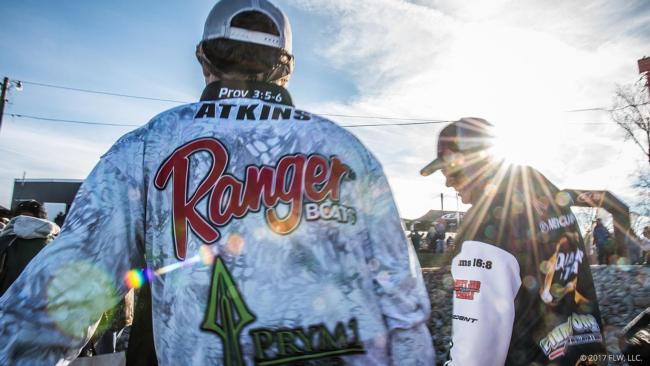Blueprint of a Champion
Justin Atkins and Jordan Lee followed a similar – and very swift – path to the top of the sport

Professional bass fishing has entered a new frontier. Recent tournament results confirm it: Today’s younger athletes are ready to take on the rigors of life on tour, and are excelling far quicker than any entry-level pros in history. Nowadays, kids right out of college are well trained for this unique sport and lifestyle, and they are cleaning up in the process.
No two better examples exist than 2017 world champions Justin Atkins and Jordan Lee. Extremely close friends off the water, Atkins, 27, and Lee, 26, both took down top titles this year – the Forrest Wood Cup and Bassmaster Classic, respectively – placing them at the pinnacle of the sport and laying the foundation for successful careers.
But how did all of this come about? Was it simply youthful enthusiasm and a bit of luck that put each in the winner’s circle? Not quite.
Both Lee and Atkins carefully planned each move of their careers from an early age, recognizing the potential of a new direction in professional bass fishing that they were able to exploit.
Upbringing
It’s safe to assume that most superstar anglers are born with a fishing bloodline, but that wasn’t the case with 2017 Bassmaster Classic champion Jordan Lee. Overall, no one in his immediate family was an avid angler, and most of Lee’s early fishing experiences were carried out in his grandfather’s small pond.
Conversely, Atkins went all-in early. He was groomed by his father, Philip, who shared a competitive bass passion. The two frequently teamed up for local events when Justin was still in grade school.
“I vividly remember my dad casting for me and letting me reel it in,” Justin says.
In any case, both young pros experienced a unique transformation in their teenage years that would help shape their careers. They acquired fishing buddies, as well as major support from their parents.
“A friend, Gavin Ellis, introduced me to tournaments,” says Lee. “In high school, fishing wasn’t necessarily cool like it is some places, but there were people into it.”
Without question, parental encouragement played a key role. Lee describes his father, Bruce, a successful veterinarian, as a “self-made man that was always working … but really supportive.” As Jordan pursued his passion through his teenage years, his parents recognized the commitment, and rewarded it by purchasing a Ranger Z20 when Jordan turned 16. In addition, Leigh Lee, Jordan’s mother, would routinely drive him to junior bass club meetings more than two hours from their home.
In the Atkins home, Justin competed for several years with his father, then jumped into the Bassmaster Weekend Series with his fishing buddies and ended up winning the league’s national co-angler championship, along with $50,000. In addition, Justin was competing as a co-angler in the Costa FLW Series, where he met Scott Canterbury, who became a highly successful pro and helped teach the up-and-comer the ropes of life on tour.
Justin’s parents also did all they could to nurture the youngster’s passion. Ranger owners since 1982, the family understood the tournament fishing profession and lifestyle. In fact, the need for pro bass career planning was ingrained early on. Originally hailing from Columbus, Miss., Philip Atkins talked with his son about relocating to a central location with more tournament opportunities, as well as guiding to help fill in the gaps. Later, the younger Atkins would take his father’s advice, and he now lives in Florence, Ala., and supplements his income by scanning lakes for the production of contour maps.
The next phase: college
Timing dictates many aspects of life, as Lee and Atkins can attest. They finished high school right as another monumental shift was occurring in the industry. College fishing was booming. Both entered college focused on becoming not just a student, but a student athlete – a college angler.
“I knew it wasn’t going to be easy,” Lee says, “but then they [B.A.S.S.] offered a spot in the Classic for a college angler, and that really opened my eyes to the possibility. It became a goal to shoot for.”
Atkins, who, after finishing a two-year degree, took a few years off from school to compete across the Southeast, watched as Lee grabbed the spotlight.
“I saw the attention Jordan was getting,” he says. “And I wasn’t getting that competing at the regional level. I saw it as a key to meeting sponsors or getting a job in the fishing industry.”
Determined to set up his own career, Atkins threw his hat in the college ring and attended Mississippi State, where he already had friends on the bass team. His decision to become a Bulldog was “about 95 percent” based on Mississippi State’s fishing program.
Here again, they both benefitted from a monumental shift in the industry. College fishing not only became popular with much of America’s youth, but industry support qualified scholastic bass as a premier place to hunt for new talent, in some cases even more so than the nation’s AAA tours, which compounded validity and confidence in the anglers while molding them into better, more qualified spokespeople.
Making the turn toward pro
Lee and Atkins met in 2011, drawing out together in a Costa FLW Series event at Lake Okeechobee – Atkins in the front of the boat, and Lee as a co-angler. Immediately, they became close friends. Throughout college, the duo would team up in local team tournaments, learning from each other and bouncing ideas back and forth about how to break through in a cutthroat sport.
From that point, Lee’s Cinderella story is well documented. After qualifying for the Classic as a college standout, he pushed through the B.A.S.S. circuits, soon landing on the Elite Series and taking down the Classic at the age of 25. Lee credits the college format and its nationwide opportunities as a major reason for his success.
“Going to lots of lakes, I got to see a lot of places before I started [on the Open or Elite circuits],” he says.
The college team format was also was an aid.
“Having a partner in your boat to bounce ideas off and learn new techniques from helps, too,” Lee adds.
Atkins found similar advantages to the college program, but also capitalized on other FLW circuits such as the T-H Marine FLW Bass Fishing League to launch his career on the FLW Tour.
For instance, when Atkins found out the 2017 BFL All-American was going to be on Pickwick Lake, his adopted home waters, he knew that having a premier championship event in his backyard would allow him a competitive advantage in terms of lake knowledge and practice time, and that it’d set up another potential source of income to help him launch an FLW Tour career in 2017. He went all-in with preparation for the 2016 BFL Regional at Lake Dardanelle, went on to place third and secured his ticket to the working man’s big show.
At the All-American, he again placed third, winning more than $23,000 with corresponding bonuses. At the time, Atkins was competing in his rookie year on the FLW Tour, solidified by a solid sponsorship from Prym1 Camo. Atkins’ third-place showing at the All-American was a fortunate part of the plan that further allowed him to compete full time on the FLW Tour. There, he shared travel costs and strategies with roommates Brandon Cobb and Shane LeHew, ensuring all three qualification to the Forrest Wood Cup in August, where the unassuming Atkins took down the Tour’s best anglers en route to championship status and $300,000. It was a perfectly laid plan that he executed flawlessly.
That’s the biggest similarity in Lee and Atkins’ careers: mature decisions, made at a young age. Each recognized a goal early on, based his college choices to correspond with that goal and followed through immediately afterward with targeted career paths offering the potential for monumental advancement. Such is a far cry from the stereotypical twenty-something with a lack of direction or focus.
The storybook ending for both Atkins and Lee didn’t come without tremendous hard work and sacrifice. And, as the best competitors in this unique sport have known for years, such work ethic is far more important than eagerness or luck.
Yet the state of fishing today should be given some acclaim. As bass fishing advances and is more recognizable by the general public, it’s become a justifiable career goal. Competitive fires are being stoked in college, as team fishing pushes the sport to new levels with America’s youth. The industry itself has followed suit. Non-endemic sponsors likely will in the near future, too, with support packages rivaling those normally reserved for established pro anglers on the major tours.
The timing and execution were simply right for Atkins and Lee, who dreamed of careers in fishing and made their dreams come true.
“All I’ve ever wanted to do is be a professional fishermen,” says Atkins. “I’ve never had another option.”


